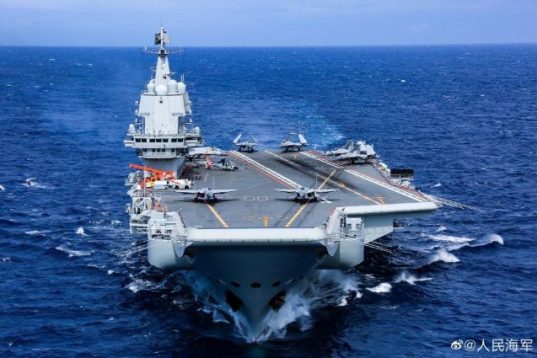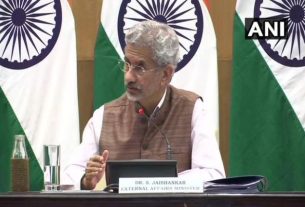TAIPEI, TAIWAN: China launched a series of influence campaigns against Taiwan last week, unveiling a plan to promote integrated development across the Taiwan Strait while at the same time conducting large-scale military incursions near the island.
Beijing’s carrot-and-stick approach received mixed reactions from Taiwan residents.
Many view the plan, which promises to enhance access to China for Taiwanese investors and encourage Taiwan residents to study, work, and live in China’s southeastern Fujian Province, as an old trick that lacks substance. Others think it can help improve and diversify the economy of Taiwan’s outlying Kinmen and Matsu Islands
“It feels like the Chinese government is trying to achieve peaceful unification with Taiwan by offering a lot of economic benefits,” Edward Yang, a 36-year-old engineer living in Hsinchu City, told VOA in a phone interview.
But as China struggles to boost its slumping economy, Yang remains suspicious about the likelihood that Beijing can offer economic perks that would be attractive to many Taiwanese.
Others think the proposed plan includes many measures that are helpful to residents in Kinmen and Matsu and it will be beneficial to the long-term economic prospect of the two outlying islands.
“The proposed plan wants to increase the connectivity between Xiamen and Kinmen, which will be good for the development of Kinmen,” Yen Da-jen, an 83-year-old businessman in Kinmen, told VOA in a phone interview.
Fujian, with a population of 40 million, is the Chinese province closest to Taiwan both geographically and culturally. The idea of turning Fujian into a demonstration zone to facilitate integrated development first appeared in official Chinese documents in 2021, and the integration plan was raised again at a forum in China in June 2023.
The decision to unveil the plan on Sept. 12 comes amid ongoing tensions across the Taiwan Strait and as Taiwan is gearing up for a highly competitive presidential and legislative election in January 2024.
Mixed reception of the cross-strait integrated development plan
During a news conference on Sept. 14, Chinese officials characterized the establishment of the demonstration zone in Fujian as an effort to deepen cross-strait integration and as laying the foundation for peaceful reunification.
Based on the plan, Beijing would prioritize integrated development between China’s coastal cities, including Xiamen and Fuzhou, and Taiwan’s outlying Kinmen and Matsu islands. The proposed measures include facilitating the supply of water, electricity, and gas and building bridges between the Chinese cities and Taiwanese islands.
On the business front, the Chinese government said Fujian would provide a better business environment for Taiwanese people and Taiwanese enterprises, and Beijing encouraged Taiwanese workers and their families to settle in the province, vowing to improve social welfare programs.
Some Taiwanese working in China say Beijing is trying to create division within Taiwan through the proposed plan because it will only seem attractive to Taiwanese businessmen investing in China and residents in Kinmen and Matsu.
“The plan will only benefit residents on the outlying islands and Taiwanese businessmen with interests in China, so I don’t think Beijing can use the plan to change the Taiwanese public’s overall perception of China,” Bruce Wang, a 32-year-old man working in southern China, told VOA in a written response.
However, some residents in Kinmen say the local community will welcome any preferential policies that’ll be good for the economies of Kinmen and Matsu. “When there are economic exchanges, we can make money,” Yang Zhongyi, a 50-year-old businessman in Kinmen, told VOA in a phone interview.
“Even if China thinks we belong to the same country, but we don’t agree with that idea, people in Kinmen still welcome opportunities to conduct cross-strait economic exchanges because it helps to improve our livelihood. We are happy to see more relevant developments as long as there is no military conflict,” he added.
In response to Beijing’s proposal, Taiwan’s Mainland Affairs Council, which handles cross-strait relations, said the Chinese government’s proposed measures are simply wishful thinking.
Some analysts say Beijing hopes to establish a connection between Taiwan and China through the demonstration zone by making exchanges between Kinmen and Xiamen easier.
“The symbolic meaning of this plan is more important than its actual effect because as China’s overall economic conditions remain unideal, Beijing’s attempt to attract Taiwanese to buy real estate in Fujian won’t create its intended effect,” Chung Chih-Tung, an assistant research fellow at the Institute for Defense and Security Research in Taiwan, told VOA in a phone interview.
Large-scale military incursions around Taiwan
While China tries to sell the narrative of “cross-strait integration” through the proposed measures in Fujian, Beijing has also conducted several large-scale military incursions around Taiwan in recent days.
On Sept. 18, Taiwan’s Ministry of National Defense reported 103 Chinese military aircraft operating near Taiwan in 24 hours, and on Sept. 14, the ministry detected 68 Chinese military aircraft operating near Taiwan.
In response to the Chinese military incursions, Taiwan’s defense ministry Monday urged Beijing to “immediately stop” the “destructive military activities.”
Some Taiwanese say Beijing’s recent military incursions have further increased their negative perception of the Chinese government.
“These dirty tricks carried out by Beijing have increased my negative feelings towards Beijing,” Sharon Su, a 33-year-old insurance worker in Kaohsiung, told VOA in a written response.
Some experts say Beijing’s carrot-and-stick strategy is part of its concept of deterrence.
“They want to provide a warning through the military exercises that any move towards independence would be unacceptable while offering the carrot of economic integration by easing the path for Taiwanese businesses and business people in the mainland,” Rorry Daniels, managing director of Asia Society Policy Institute, told VOA in a phone interview.
Despite these efforts, Daniels says neither strategy seems to be working in Beijing’s favor.
“The military signals seem to be pushing Taiwan toward closer ties with the U.S. and the economic integration plan seems to fall a bit flat at convincing Taiwanese people,” she said.
But with less than four months until Taiwan’s presidential election, Chung from the Institute for Defense and Security Research expects China to keep rolling out other influence campaigns against Taiwan.__VOA News





